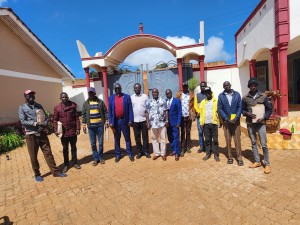Traditionally, cattle rustling has been a long-standing practice in some pastoralist communities, often tied to culture, rites of passage, or as a way to restock herds. However, in modern times it has become more violent, organized, and commercialized, involving armed groups who raid villages or herders, driving away animals to sell them for profit.
SAKI preliminary investigations reveals that there has been an number of armed groups or individuals who carry out these raids in Turkana, Baringo, and West Pokot. This bandits are organized cattle rustlers who use violence and weapons to raid communities for livestock or other resources.
- They are often heavily armed with guns.
- They operate in gangs, sometimes across borders.
- They don’t just steal cattle; they may also attack communities, leading to deaths, displacement, and destruction.
From the Valley of Death to Pathways of Peace: Government Amnesty and SAKI Program Inspire Hope in Kerio Valley
Iten, Elgeyo Marakwet County – Amidst intensified security operations in the Kerio Valley – often branded the “Valley of Death” due to decades of conflict, the Government of Kenya has extended a groundbreaking amnesty to bandits willing to surrender, disarm, and pursue peace. In a significant breakthrough, seven of the region’s most notorious rustlers, long on the most-wanted lists of Elgeyo Marakwet and West Pokot Counties, have embraced this call.
To support their transition, the SAKI, in collaboration with the National Counter Terrorism Centre (NCTC), organized a three-day engagement in Iten Town. During the event the reformed bandits spoke openly about the torment of life on the run, years spent hiding in caves and thickets, dodging bullets, and cut off from community and family. “Today, I feel free for the first time in years. I want to walk a new path, one of peace and dignity,” said one of the former rustlers, expressing relief and hope for the future.The program provided psychosocial assessments, counseling, and practical reintegration pathways designed to help participants rebuild their lives.
“This initiative demonstrates that lasting peace is possible when government, civil society, and communities come together with a shared vision,” said [Insert SAKI Leader’s Name/Title]. “By addressing the root causes of vulnerability and offering viable alternatives, we are not only transforming lives but reshaping the future of the Kerio Valley.”
The reintegration program reflects a broader effort to heal broken communities, reduce cycles of violence, and build resilience across the region. The Government of Kenya has reiterated its commitment to extending amnesty to all who choose peace over conflict.
Call to Action
SAKI and NCTC call upon all stakeholders faith leaders, community elders, development partners, and local governments, to rally behind this initiative and support reformed individuals as they rebuild their lives. Together, Kenya can turn the Kerio Valley from a “Valley of Death” into a valley of hope, peace, and shared prosperity.
Looking Ahead: Economic Empowerment for Sustainable Peace
Beyond psychosocial healing, SAKI is championing economic empowerment as the cornerstone of sustainable reintegration. Plans are underway to equip reformed bandits with vocational training, apprenticeship opportunities, modern farming practices, and pathways into entrepreneurship. By creating livelihoods that replace the lure of cattle rustling with dignity and income, these individuals can reintegrate as productive members of society – contributing to local economies and serving as role models for peace.



